#detractive
Text
fat people 🤝 disabled people
having to play 20 questions about our lives and medical histories with literally everyone we talk to because accepting the idea that people like us could live quite happily exactly as we are without spending every single spare moment of our time and energy dedicated to "fixing" what's "wrong" with our bodies is too uncomfortable for them to even comprehend, let alone the concept that most of our problems are actually caused by the way other people view and treat us and are not, in fact, a direct result of something that we've done "wrong" that they can avoid by living "right"
#decided to make my own post so as not to detract from the other one#fat liberation#actually disabled#cripple punk#disabled liberation
1K notes
·
View notes
Text

not going to put the person who said this on blast but come the fuck on. i have an expansive vocabulary and atypical way of articulating and expressing myself because of various personal experiences that affected my language and speech development. this is just a really immature and unkind thing to say to someone.
#🐉#like if you think i use overly complex or flowery prose that detracts from my points just say so. you dont have to invoke some AI boogeyman.
755 notes
·
View notes
Text
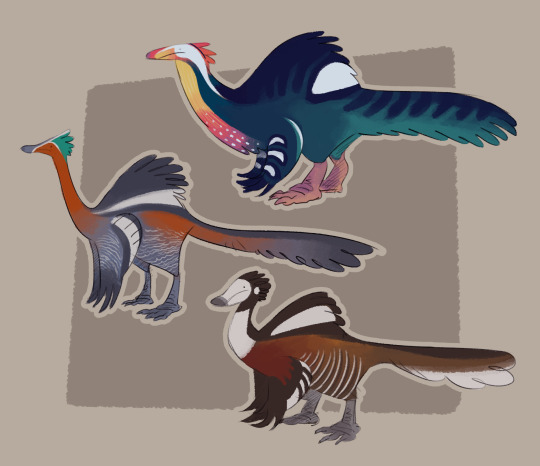
🦆quack quack🦆
#my art#paleoart#deinocheirus#tried to mash up the patterns of several extant ducks so its not like a carbon copy but you can still tell the main sources#if you know your ducks anyways haha#the original plan was just variation in proportions while still being clearly deino- i hope the colors dont detract from that too much#dinosaur
880 notes
·
View notes
Text

Lestat, surrounded by feral vampires and wracking his brain on how to save himself, nicki and gabrielle, but still finding time to flirt:

#i know i know theres some context here. lestats being captivating to win the coven over. lets not let that detract from my desire to joke#the vampire lestat#vampire chronicles#iwtv#i debated word choice between flirt and neg
386 notes
·
View notes
Text

i've always wanted to die clean and pretty
but i'd be too busy on working days
so i am relieved that i left my room tidy
they'll think of me kindly as they come for my things
- last words of a shooting star
#do you know what shooting stars do? they fall.#i also wanted to add arrows but i felt like that would detract from the contrast#secret life smp#secret life#secret life etho#life series#ethoslab#trafficblr#secret life spoilers#kiwi’s scribbles#blood tw#ALSO THE ENTIRETY OF THAT SONG IS HIM IT WAS SOO TOUGH PICKING LYRICS FOR THE CAPTION
1K notes
·
View notes
Text

At some point in my playthrough of the game, it dawned on me that Feldspar is Old
#listen i found their design very very appealing to me nfghdfjbbd#it took a while for my brain to realize that they're not like young tumblr sexyman#granted they dont seem THAT old hdfhdrgjb#and them being old doesn't detract from how cool they are eithe r#it's just a funny observation i had one day fgnhjfghk#their spacesuit fucks hard though like awesome design#outer wilds#xan draws
198 notes
·
View notes
Text
Thinking about how the 1941 minisode really sets the stage for the following two episodes. It establishes the mutual trust between them. It establishes Aziraphale finally coming to terms with calling Crowley friend. It establishes Aziraphale as someone who is capable of deceit under pressure and, frankly, as someone who works better under it. It nods at the idea of Crowley's angelic status being potentially returned and rejects the idea in the same sweep with Aziraphale's failure to turn a turnip into an inkwell. It even presents the whole crux of the way Aziraphale and Crowley interact as summarized by the aim for my mouth but shoot past my ear thing. And then there's the whole shades of gray conversation.
There's something interesting in that conversation in particular I wanna draw attention to specifically because. Look what happens in the conversation after they have discussed Aziraphale's magic and verbalized the trust Crowley has in Aziraphale.

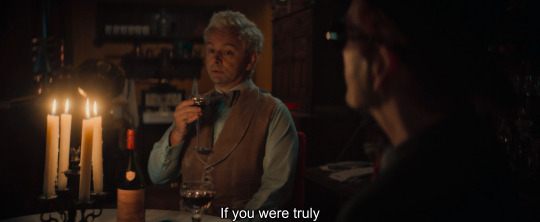

Doesn't it sound familiar?
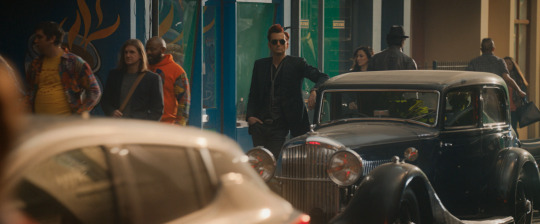
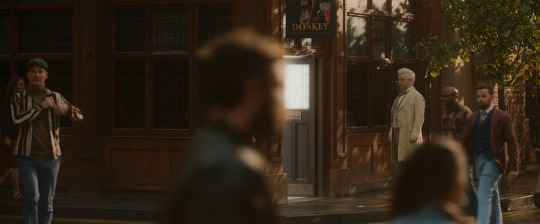
It sounds a lot like the least charitable takes on Aziraphale's actions at the end of this season doesn't it? But Crowley rejects the idea pretty much immediately. Saying nah, that's the trouble with you lot. You see something and think it's black or white. He presents the idea, just as he has in all three minisodes, that sometimes the edges need to get blurry.


And Aziraphale agrees. He out loud starts speaking of gray areas in morality and how Crowley's right here. It once again emphasizes this idea that all three minisodes have gone out of their way to emphasize - that Aziraphale is capable of growth and change and most importantly of stepping into that middle space, knowing sometimes it is the right thing to do.

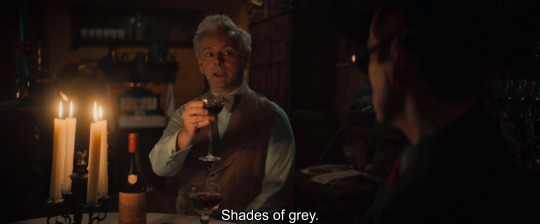
The fact that this blunt verbalization of the lessons of all three minisodes happens right after Aziraphale muses about a potential scenario where someone leaves tells us a lot about Aziraphale's actions in the end. It's drawing stark attention to them and tying those concepts directly together. It doesn't matter which theory you favor either - whether Az is lying to Crowley in the end or acting to protect him or doing what he thinks is right - it doesn't matter because they are all morally complex choices. They all exist in the gray spaces and Aziraphale knows it and that's such a fascinating angle to consider with his decision making here.
#good omens#good omens season 2#aziraphale#crowley#good omens meta#finishing this so my brain will let me focus on literally anything else oops#hilariously this is arguably another example of Crowleys temptations having a tendency to blow up in his own face#but i think that detracts from the point im making so in the tags itll live
790 notes
·
View notes
Text
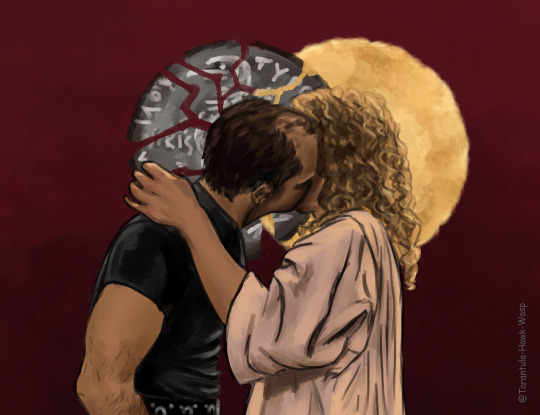

judas, must you betray me with a kiss?
happy easter with some jesus christ superstar 2000 redraws
#my art#artists on tumblr#artwork#easter#jesus christ superstar#jesus christ superstar 2000#jcs 2000#jcs#jesus x judas#jesus christ#behind judas is a tyrian shekel which was probably the silver currency he got paid with#listen did i need to do a whole gold shattered background? no. does it detract? maybe. I dont care i was put on this earth to draw halos#and radiating lines and gilt backgrounds ok#jcs 2000 can have blond jesus rights bc hes pretty and they make his hair soooo golden in the lighting like a halo almost#i did a version with the haloes for the second one but it was too visually busy around their heads
240 notes
·
View notes
Text
the F1 community, united by the stupidity of Formula One
#f1#formula 1#seriously though the reasons they gave for rejecting andretti were such bullshit#saying they wouldn't be successful? come on man#that the andretti name would detract from the f1 brand?#while visa cashcow and team gambling are on the grid#mr 'i refuse to invest' haas can stick around but a team who's successful across multiple motorsport series can't#it's ridiculous
331 notes
·
View notes
Text
One of the things I just adore about the fannon portrayal of Jehan Prouvaire is how most people depict him as effeminate or nonbinary, somewhat introverted, shy, and disinclined to aggression, but they do so with nuance.
Jehan isn't shown to be defenseless or weak-willed, he fights for what he believes in and generally doesn't fall into that delicate twink stereotype. So often, I find the characters I relate to most cannot be shown as both the queer, eccentric, and introverted type as well as the assertive and strong character. Jehan stands out, however.
#probably because he's a character largely written by a bunch of queer people who understand how one can be fem and “demure”#and also a fighter and a leader#fannon jehan has definitely helped me reflect on my identity as a nonbinary queer and fem person and recognize that those traits don't#detract from respectability#anyways good morning I'm ranting about dead French twinks again#les amis#les mis#jehan#jehan prouvaire#queer characters#les miserables#barricade boys#popcornwithnate
127 notes
·
View notes
Text
ok honestly? i didnt notice the senshi pantyshots before it got turned into a meme because it's not gratuitous at all
THIS THO...

ripping off her shirt. revealing feathered boobs with blood dripping from her neck.... framed by muscular wings... that's so horny...
#dungeon meshi#falin touden#category 5 monsterfucker event#ryoko kui is so good at it that even the human part just adds to the spice instead of detracting from it
237 notes
·
View notes
Text
i think fandom spaces would become much more enjoyable across the board if people stopped flipping their pancakes over other fans enjoying characters that they don't like. or, god forbid, like them but in 'the wrong way.'
#salty peak sect 🧂#jin guangyao#jgy haters you do realize that you are as integral a part of this wheel of dead horse reincarnation as jgy stans are. right?#you realize that our liking jgy and believing he did good things does not in any way detract from your ability to enjoy wei wuxian#as your specialist good boy. right?#you realize you could just scroll past takes about people enjoying jgy without deciding to drop your own pass-agg vaguepost#questioning our morality in the tags. right?#you get that it's weird to act like we're the weird ones for responding to provocation. you have to get that that is a weird way to think.#consider instead: staying in your lane!! minding your business!!!#you can in fact just leave us alone! you can do that! the power is yours!!#nb: this is not directed at the people who have genuine questions/commentary about jgy that are critical in nature. that's fine.#please recognize i am not talking about you!#i scroll past so many of your posts even tho i disagree with them#because your stuff is not the stuff that is making me benafflecksmoking.jpeg#maybe sometimes i'll comment if i think i have something useful to add#and if i think OP is not going to be a dick#most of the time i frankly would rather get high and read xiyao fanfic#that is usually why i am in the tags: to read fic and look at cute fanart#i am not visiting the tags because i want to pick a fight! truly i'm not!#however. if you start one. i will probably finish it. 😌 hth
75 notes
·
View notes
Note
I vaguely remember something about Helsknight going to confessions? I’m interested as to why and what he confesses to :3
Hi, this has been in my inbox for a hot minute, but it got me thinking, and I kept thinking so. Have a snippet.
_____________________
Please read the tags for the TW list!
_____________________
The Confession room for the followers of the Saint of Blood and Steel was exactly the same room they trained and dueled in. The only difference was, at a certain time of day, on two specific days of the week, there was a little white sign on the doors that said "Confession Open." There was almost always a line. Only one person was allowed in the confessional at a time. There was no law or order or rule that dictated everyone wait in silence, but there was something particularly embarrassing humbling about standing in a line of armed and armored knights, all waiting patiently for god to slap them on the wrist.
The door opened. A knight exited with her head held high, though Helsknight noticed she clutched her arm a little too close to her body. She walked past the line down the hall, to the little room on the left where the pleasant and somewhat dissonant smell of baked goods warmed the air. The line shuffled forward a step.
The wait was long, and awkward, occasionally broken by stilted small talk, and the lethal sounds of mail and blade, and the scuffing of boots. Helsknight had gotten into the habit of bringing something to read while he waited. It gave him a good excuse not to make prolonged eye-contact with anyone, and he had grown bored of making shapes out of the mosaic tiles ages ago. He could only look at the same repeating pattern so many times before he realized they all looked vaguely like a dog lifting a leg to pee, and thinking about bodily functions while waiting in a long line was a great way to convince himself to leave the line. Then the chances of him getting home in a timely manner after his confession [or really going to confession at all] dropped exponentially.
The door opened. A young knight limped two steps down the hall before a priest, waiting at a nearby bench for expressly this purpose, dashed over and put the knight's arm around his shoulders. The knight muttered a wincing thanks, and together they limped down the hall to that same, sweet-smelling room. As soon as they turned the corner out of the main hall, the knight let out a loud curse, and there was the heavy sound of someone collapsing into a convenient chair. The line shuffled forward a step.
A twitchy squire standing in line in front of Helsknight stared at the door wide-eyed, and then forward to the confessional sign, which they regarded with the same blatant fear as someone confronting their own noose. Helsknight looked down at the little book he was holding, sighed, and decided to show a little mercy. He was at confession, after all.
"The Saint isn't cruel," Helsknight told them softly, and just the sound of his voice startled them nearly out of their boots. "Whatever your penance is, it will never be beyond your means."
The squire flashed him what was probably supposed to be a nervous smile, but which looked a lot more like a grimace. "What if I've fucked up really badly?"
Someone in the line coughed inconspicuously. Someone else cleared their throat. Helsknight fixed the young squire with a measuring gaze, and came to the conclusion this nervy kid had probably never "fucked up really badly" a day in their life. Though he supposed he'd been wrong before.
"You could start your penance early," Helsknight said, reigning in his sarcasm as much as physically possible, "by maybe not swearing in church."
The inconspicuous cougher down the line let out a much more conspicuous snort. The squire clapped their hands over their mouth and stared up at him in horror. Helsknight sighed and pinched the space between his eyes.
"Swearing isn't against our tenets."
The hallway murmured into a soft chorus of "Amens" and "Praise the gods" and one particularly ambitious "thank fuck." A few of the knights signed various salutes and benedictions to the Saint. The squire visibly relaxed.
"It's respectful not to," Helsknight continued after the murmured din died down. "Show the Saint your contrition by respecting Their home. Is your sword sharp?"
The squire seemed a bit taken aback by this sudden change in conversation topic. They unsheathed their sword a bit, showing a dull iron blade. "Uhm... it could stand to be sharper."
"You bring your kit with you?"
The squire sighed and rolled their eyes, more from disappointment at a new chore than any real defiance. They unsheathed their sword, dropped a large messenger bag off their shoulder, and started rifling through their things. The air was soon filled with the sound of whetstone on blade. Someone behind Helsknight tapped him on the shoulder. She pointed to the squire, then to Helsknight, and offered an approving thumbs-up. Good job on distracting the scared kid. Helsknight shrugged and held out his book, flashing the title in her direction. Everyone needs a distraction in this stupid line. She rolled her eyes, tell me about it, and moved her cloak to the side, showing off a little satchel with what looked to be art supplies. Helsknight smirked.
The door opened. A knight came striding out, running a stressed hand through his hair. He started to walk past the little door at the end of the hall, but a priest came dashing out to stop him before he could make it too far. They whispered amongst each other for a moment, heads bowed close together to keep their conversation private. The priest looped a consoling arm around the knight's shoulder, and together they walked slowly into the little room. The line shuffled forward a step.
No one ever stayed inside the confessional for long. Fifteen minutes, twenty. Once or twice someone dipped closer to a half hour. Then the door would open, and the line would shuffle. Helsknight had made it through about a chapter and a half of his book [an epic poem about the deeds of one of the Saint's paladins. He brought it to keep himself in a "contrite mood", whatever the hels that was] when finally it was the squire's turn to step inside. They bundled up their gear, offered Helsknight their bravest grimace-that-was-probably-a-smile, and walked inside.
The knight behind him asked politely, "Is that your squire?"
"No."
"Ah. Just being nice then?"
Helsknight offered an indifferent shrug. "It's everyone's first confession once."
She turned this somewhat nonsensical statement over for a moment, shrugged her agreement, and went back to sketching.
Time passed. The squire exited the doors with a relieved look on their face, though they clutched their right hand beneath their arm as though afraid to look at it. Helsknight sighed, closed his book, and stepped inside. The door closed behind him with a heavy click.
The room wasn't so much dark as it was simply not as bright as the hallway outside. Beside the door was a small table, and Helsknight turned and made use of it, setting down his book, then unbuttoning his tabard. He knew whoever was taking his confession today would be nearby, ready to help him doff any armor, but he wore mail today specifically so he could slip it on and off, without having to worry about all the buckles and clips that came with chest plates and grieves. When he'd relieved himself of everything he wore or carried, besides his leggings and his unsheathed sword, he walked towards the center of the fighting ring.
A knight in full plate stood in the ring's center, a great sword planted tip-down into the dirt between their feet. The sword was simple steel, as was the armor. No enchantment or ornamentation decorated the surface. There was no plume on the closed helm. They were the image of the Saint, an unremarkable warrior, all silent strength.
Helsknight knelt at their feet, laying his sword gently between them. He sighed out a long breath.
"I come to the Saint to be shriven," Helsknight said as deferentially as he could, in the face of an often repeated task. "By Their steel, and by my blood."
The confessor nodded. "Speak your confession, brother."
Helsknight winced, and barely stifled a groan. "It's always you, isn't it, Blade?"
The confessor let out a heavy sigh. "Come on man, this is supposed to be anonymous."
"Not my fault you talk like that."
"Heh? Talk like what?"
"Exactly."
The two fell into awkward silence, Helsknight probably much more awkward than Blade. He took a bracing breath.
"I... Come to confess the sin of Wrath."
There was a long pause.
"Again."
"This is normally where I ask what you did, and why," Blade said witheringly, "but it was plastered all over the broadsheets this morning."
Helsknight pinched the space between his eyes.
"If it makes you feel any better, I gotta agree with the West Side Tabloid. He had it coming." Blade said, leaning a little too nonchalantly on his greatsword. "You don't just call someone a coward like that. It's violence theater. If you bring real honor into it, you're begging for trouble."
"I... Agree."
"So, you lashed out in anger and got blood all over the nice Colosseum sand." Blade continued. "You lost your temper, but you were defending your honor. And I wouldn't even call it all that cruel. It's not like you tortured him or anything."
"Am I being pardoned?"
"Depends," Blade said, in a casual tone that suddenly didn't seem wholly his own. "Where else have you vented your Wrath, brother?"
Helsknight licked his teeth, as though he expected them to taste like blood. "I... attacked a thief today. He stole from me, and I was in my right to defend that."
"But you harmed him past self defense," Blade prompted, when the silence stretched long.
"If he hadn't escaped me, I would have." Helsknight paused, and added. "I had wanted to."
"Wanting isn't the same as doing," Blade offered charitably.
"I would not have stopped myself."
"Has Wrath consumed your life in any other ways, brother?"
"My hermit."
Blade nodded solemnly.
"We fought recently. I won. It was unprovoked. I was having a bad morning, and I needed -- I wanted to take it out on him. So I did."
"Have you asked forgiveness from the people you've harmed, in your sin of Wrath, brother?"
"No."
"Have you attempted any restitution?"
"No."
Very suddenly, the greatsword in Blade's hand was sheathed in red. It was light, bright and scouring, and it filled the air with the taste of blood. Even knowing it would happen, Helsknight flinched at the sight of it. His hair stood on end, and the air seemed charged, like the breath before a lightning strike. The Saint, alive and present, glimpsed for a moment through Blade. The confessor-turned-paladin tilted his head back slightly, and Helsknight knew if his face weren't covered in the helm, his eyes would be red, brimming with bloody tears.
In a voice that was Blade's, and something past him, empowered by faith, brutal and scouring, the Saint said, "Stand, and pick up your sword."
Helsknight did as he was bidden. His heart fluttered a little too fast in his chest, and while his hands did not shake, they felt near to it, unsteady. Helsknight was one of the best fighters to have ever crossed the Saint of Blood and Steel's threshold. If he were simply fighting Blade, there was a decent chance he'd win, though Blade had been his match many times before.
He was not only fighting Blade, though.
"As a knight of the Saint's order," Blade and the glimpse of the Saint beneath said, "you swore to uphold Their tenets, even in the face of great adversity. By raising your sword, not in Their wrath, but your own, you break that tenet."
Blade let out a breath, like someone barely keeping their head above water. Helsknight wondered if that was what being a paladin in the service of a Saint felt like: held under water, drowning under divine will.
"Yet Their order teaches that even the Saint is fallible, and once, Their will was driven, not by divine purpose, but by reckless bloodshed. As They were once challenged, now They challenge you. Do you accept?"
Helsknight didn't have to accept. This part had been emphasized a lot when he joined and took his first confession. Anyone was allowed to deny the Saint's trial and simply accept their penance. The penance wouldn't change. There was no incentive for, or against, besides maybe his own personal need to prove he really was in the wrong. Maybe it was pride made him accept every time. Maybe it was spite. Or, maybe, it was simply the need to punish himself for the lack of control he felt.
Solemnly, Helsknight nodded.
"Then Pick Up Your Sword, and Smite Me."
That was all the warning Helsknight was given. Blade, or the Saint, or the Saint's Will, or all three together, lunged.
It did not take long. By the third swing, Helsknight's blade was sent crashing from his hand, though he met the Saint's blade with all the strength and mastery he could muster. Losing to the Saint was an indescribable thing. It wasn't like losing a match in the Colosseum, or like losing a duel against Blade when they sparred. It was like an ant scratching at the heels of a giant, a kitten swatted aside by the massive claws of a dragon. If he swung his sword at a wall, at least there was the smallest chance the stone would chip. There was no chance in this. There was only the token effort of the attempt, one clash, then two, then three, and then his sword was gone from his hand. Blade slammed a palm into his chest, and Helsknight was on his back, gasping for breath, having crumpled so quickly he hardly had time to register he was watching the ceiling.
"By the divine right of contest, brother, Their will is done," Blade, The Saint, both and neither, said. Helsknight laid on his back and waited, catching his breath. "Hold out your sword hand."
A jolt of fear lanced through Helsknight then. He hated, he feared, hand wounds. It was an odd folly of his that he'd never been able to shake. Blade knew it. The Saint probably knew it. It felt unfair to punish him with it, or cruel.
Helsknight closed his eyes, and he stared down the scared little squire in his head.
[The Saint isn't cruel. Whatever your penance is, it won't be beyond your means.]
And then, for good measure, as he offered his right hand forward, [you deserve this.]
The cut was quick and clean. The blade was supernaturally sharp. The wound took time to hurt. Still, Helsknight's head spun. His breath came too quickly in his chest. Blade had to repeat himself twice when he asked for Helsknight's other hand. Then his vision tilted more, stars blooming in burst around his peripherals, edged in black.
When he found himself again, Blade had carried him to the table and rested him there, and stood bandaging his hands. His own hands were shaking, every shudder sending a jolt through Helsknight's arm. Helsknight turned this observation over distantly, curious in the way of the desperate, clinging to small details to better make sense of the world. Blade didn't normally shake when they did these sessions. Maybe he, too, had objected to wounding Helsknight's hands.
"Sorry... About that," Blade stammered hoarsely. "It's... You haven't made restitution. And it's a problem you keep having."
Helsknight didn't trust himself to speak, so he nodded.
"It's not bad," Blade said, trying to reassure both of them. "No muscles or tendons or anything. It was just a lot of blood."
"Yes," Helsknight said airily, still a little too unrecovered to explain the blood hadn't been the problem. Not really. Not that it needed explaining.
"Go see the priests down the hall," Blade informed him needlessly. "You need stitches, especially near the veins on your wrists. They need to heal naturally. Over time, as penance for your Wrath. You may lessen your time through acts of service to the church, if you so choose."
Helsknight nodded.
"Do you need help walking?"
Helsknight blinked slowly, his sluggish, shocked mind slowly crawling to life.
"Helsknight," Blade said, putting a still-gauntleted hand against his face. The cold metal felt good against his feverish skin. "Are you hearing me?"
"I hear you," Helsknight said, ashamed of how weak and small his voice sounded. "I need help with my mail.'
"Maybe we should make sure you can walk first?"
"Every other knight walks into this room and back out again fine," Helsknight said, his pride slowly crawling to life in his chest. "I just... I just need some help."
Blade, as much as a man obscured by a full suit of armor could, looked relieved. He nodded, and after a few moments of coddling, they managed to get Helsknight on his feet and dressed again. He squared his shoulders and walked with purposeness down the hall, his vision only swimming a little. The spiteful little animal in him wanted to keep walking until he was home, and he almost did. But a priest ducked her head out the door of the room at the end of the hall, and fixed him up in a concerned stare, and Helsknight, tired in body and soul, followed her inside.
The little room held tables and chairs, and a counter brimming with freshly made breads and rolls. Sweet things, prepared in advance of confession for those who might've lost too much blood, or for those who needed something soft and warm to take the edge off their penance. Helsknight allowed himself to be guided to a seat. The priest who had pulled him in checked over the hasty bandages, let out a disapproving tsk! and began organizing some supplies. She was joined by two other priests who began quietly discussing the best way to go about his stitches. Someone put a slice of some freshly baked something-or-other in front of him, and Helsknight ate it with the mechanical necessity of someone who recognizes a chore that needs doing.
Months later, Helsknight and Tanguish sat at a fountain outside the First Church of Hels, their breakfasts in their laps. Helsknight ran a thumb self-consciously along the odd, thin, centipede-like scar that danced from the center of his palm down his forearm. Tanguish must have noticed, because he asked, "How did you get that one?"
Helsknight turned his wrist so Tanguish could get a better look. "Lost my temper at something."
Tanguish ran a gentle finger across the misshapen skin, his touch cool and soothing. "It looks like it hurt."
Helsknight shrugged. "Not as bad as you'd think. It hurt more when they took the stitches out. S'why it looks like that."
Tanguish yanked his hand away like the scar had come alive and bitten him. "Why didn't you just drink a health potion?"
Helsknight chose his words carefully. "I needed to remember it."
Tanguish grimaced and allowed, "You... are very scary when you lose your temper." He reached out a hand to run his fingers tentatively along the scar again, as though he could somehow heal the long-passed harm. "You've gotten a lot better though."
Helsknight shrugged.
They returned to their prospective breakfasts, Helsknight eating with much less enthusiasm than his companion. He wished Tanguish didn't have such a preference for baked goods and sweet foods. They reminded him too much of that long hallway, and that door at the end of it -- and how long it'd been since he last stood there and waited to meet his Saint. Helsknight resolved to visit again when he got the chance. Just as soon as he ordered his list of sins. He remembered when he fought the Demon, sighed, and quietly put Wrath in its place at the top of the list.
#rns ficlet#rns ficlets#helsknight#saint of blood and steel#redstone and skulk#tw religious trauma#tw blood#tw religious harm#tw religious themes#ask to tag#my brain it is melting#this is kinda sorta a cut chapter from RnS#from Helsknight's POV#when they had their fight originally Tanguish was going to leave and come home to Helsknight in post confessional bloodloss fugue#but i thought that detracted from their argument too much#and also i didnt want our first Deep Dive into Helsknight's religion in-story to be about religious self harm
107 notes
·
View notes
Text


















A Scene for a Scene:
Kieta Hatsukoi Episode 1 (2021, Japan) ♥ My Love Mix-Up! Episode 1 (2024, Thailand)
#kieta hatsukoi#my love mix up#my love mix up th#mlmuedit#boyslovesource#asianlgbtqdramas#my gifs#my edits#mine: kieta hatsukoi#mine: my love mix up#mine: kh4mlmu#semiregular reminder: if u don't like then don't reblog :)#i'm ok with getting 0 notes if that's the case plsss#spend literal hours making your own gifsets to hate on it <3#spiderman has 5000 adaptations and nobody's out here saying u can't love toby if u love tom#i enjoyed kh. i enjoy mlmu. are either of them the most groundbreaking thing in history? not for me personally#they're both very silly very over the top shows i'm sorry to break it to anyone#that's not to detract from anyone who adores kh. that's 100% completely valid you are allowed to stan and stan hard#but stop expecting kh when ur watchin mlmu lads it's an adaptation from a manga not a remake of a live action#hhhhhhhhhanyway breathing out i just think the little parallels are cute.#you can see the differences in interpretation and i love it#anyway i can't figure out if i fixed my mlmu colouring or made it worse :v
143 notes
·
View notes
Text
It’s interesting to me that Voyager has so many episodes where Tuvok becomes disabled and then stops being disabled by the end of the episode. The obvious examples are Year of Hell where he becomes blind before the timeline is restored, and Riddles where he experiences a major brain injury whose symptoms are cured at the end of the episode. But then there’s also Endgame, where alternate timeline Tuvok is in the later stages of a degenerative illness, and Meld, where what happens to Tuvok when he mind melds with Lon Suder could arguably be considered a disability (especially from a Vulcan perspective). Arguably Flashback counts too. These types of plots aren’t uncommon in Star Trek, but I think it’s interesting that such a large proportion of these storylines in Voyager happen to Tuvok in particular.
So, why Tuvok? I think it partially comes down to the fact that many people find it narratively interesting to see the most in-control, stoic, and independent characters stripped of their skills or strengths in some way. In other words, disabling them. How does a character who is defined by their self-control and discipline deal with a sudden loss of ability to control themselves? How does a character who deeply values their independence deal with a sudden necessary dependence on others? Tuvok is arguably the Voyager character who most represents competence, ability, and control. If being disabled is to be unable in some way to measure up to the standards of what a person “should” be able to do in society, then Tuvok in his typical state represents or possibly strives to represent the opposite of that. So, from this perspective, making Tuvok disabled affects him as a character more fundamentally than it would other characters, which is theoretically more narratively interesting.
From an able-bodied perspective, it could be argued that such a storyline represents a deep-rooted fear of becoming disabled. Able-bodied people fear disability because it represents the weakness and dependence that anyone can find themselves embodying under the right circumstances. Accidents and illness and old age can happen to anyone, and happen to almost everyone in time. Disability is a fact of life, but for many people, it is a looming cloud on the horizon – something they might ordinarily choose to ignore. To explore such a theme in fiction is to thus look at a subject tinged with discomfort. To give such a storyline to a character that represents the peak of control and ability could serve either to heighten that discomfort by showing even the “strongest” person being vulnerable to disability, or to lessen it by displacing that fear from an “ordinary” and thus more relatable character to one who is unusually skilled or strong (in this case, Tuvok being Vulcan on a ship of mostly humans). Either way, though, if the character is cured in the end and their disability is gone by the next episode, that discomfort is narratively relieved. Disability affects able-bodied characters only temporarily. There’s nothing to fear – they’ll be returned to “normal” next episode.
This might make it sound as if I entirely dislike the disability storylines centered on Tuvok, but that isn’t true. To a certain extent, the cures or time resets that bring Tuvok back to his able-bodied state after every episode are an inevitable part of a mostly episodic show like Voyager. Beyond able-bodied fears and miracle cures, I do think there can be something compelling about telling a disabled story centered on a character like Tuvok. I like that Year of Hell shows Tuvok skillfully using a tactile console and navigating the ship while blind, while at the same time having much more difficulty with certain tasks than he did before, because that’s realistic – that’s how it often actually feels to become disabled. Some tasks that were easy before become impossible. Some tasks seem at first to be impossible, but over time become possible as you adapt and learn new strategies. A skilled and resourceful character can be skilled and resourceful in adapting to disability, but they are still disabled. I also like that Riddles asks the question of what it means for a person to feel less valuable when they become unable to perform the tasks they did before. That kind of question can become more profoundly unsettling when applied to a character who defines himself fundamentally by the abilities he has lost. I do think it would have been interesting if Tuvok had been disabled for longer – if disability had been a more defining element of his character rather than merely a frequent theme. But I also think that what is there in the text has interesting elements as well.
#star trek voy#tuvok#lane posts#lane's disability meta#here’s the tuvok disability post that i've been thinking about for a while#wow i wrote a disability post about a character other than seven#this is in no way meant to detract from any potential headcanons about tuvok being neurodivergent#to me his frequent lack of conformity to social rules reads as cultural difference and personality rather than neurodivergence#but of course alternate readings are equally valid
90 notes
·
View notes
Text
literally so difficult to be 1) a person who believes that hooking up indiscriminately is actually so so terrible for people 2) a person who watches a lot of television and is steeped in the usual tv relationship trajectories 3) a person who enjoys watching dynamics of all sorts play out onscreen and 4) a person who really wants all characters all the time to get a romantic happy ending
#like. what if i said syd and luca should get to make out. as a little treat#what then#would the writers probably not convey the way that wouldn't be good for them? yeah#would it detract from the mostly non-romantic plot they've been steadily building up? also probably yeah#but!! I want to explore the possibilities! I want to explore them HONESTLY. and I want everyone to end up happy in the end!!!!#cate liveblogs!
71 notes
·
View notes